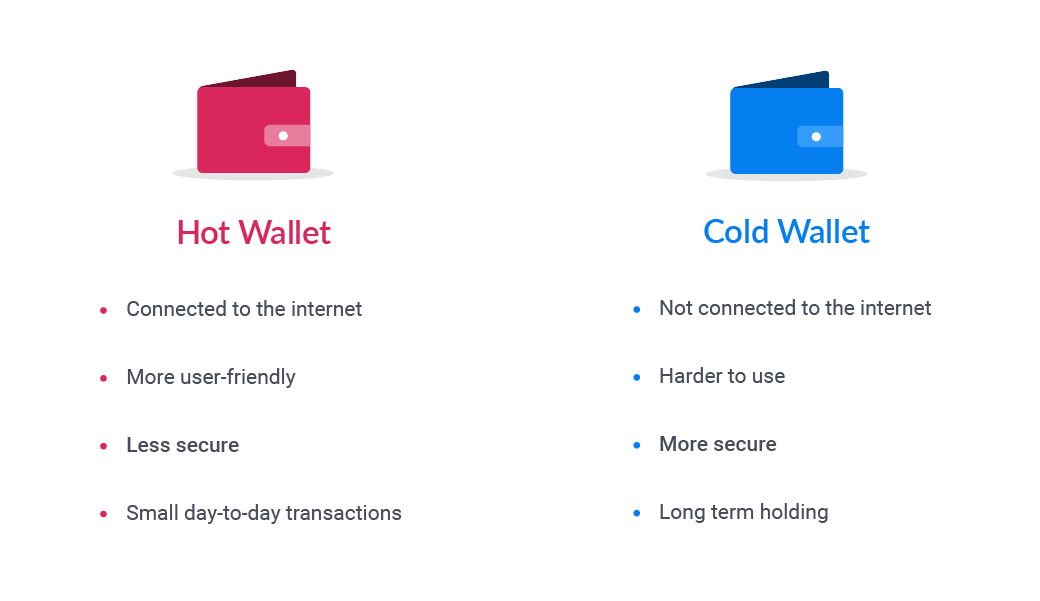When it comes to cryptocurrency wallets, there is no "one size fits all". Finding the right fit for your needs can be difficult, as there are many different offers, platforms, and various features. If you would like to learn all possible wallet variations, keep on reading.
A cryptocurrency wallet is a device, application or a service which stores and encrypts the public and/or private keys and can be used to track ownership, receive or spend cryptocurrencies. Storing cryptocurrencies requires an entirely different approach than storing physical money. Contrary to popular belief, crypto wallets do not really store your units of cryptocurrency, but rather, the private key that you use to sign transactions cryptographically. In other terms, these wallets can generate the necessary information to send and receive cryptocurrency via blockchain transactions. Among other things, such information consists of one or more pairs of public and private keys. These keys must be stored very securely. Each wallet type has its advantages and disadvantages, so it's crucial to understand how they work before moving your funds.
Before we get to know each of the cryptocurrency wallet types we have to get acquainted with a few additional crypto terms.
Hot Wallet vs Cold Wallet
The difference between a hot or cold wallet is simply whether or not these different crypto wallet types are connected to the internet.

Public and Private Keys

IMPORTANT: You should never share your private key with anyone under any circumstances!!!
Multisig Wallet

A multisig cryptocurrency wallet, also known as a “multisignature” wallet, refers to a cryptocurrency wallets types that require input from multiple parties in order to complete a transaction. Multisig wallets have a public key and more than one private key. This way it requires multiple parties to be in agreement to complete a transaction and it provides extra security, making the coins safer from theft.
Multi-Currency Wallet

Some wallets only hold one type of cryptocurrency, while others will allow you to store multiple types of cryptocurrencies in one place –wallets for all cryptocurrency. Additionally, some crypto wallets will also allow you to convert “cryptocurrency A” into “cryptocurrency B”. So if you would like to take your Bitcoin and convert it to Ether, you can do this inside specific wallets that have this feature.
Cryptocurrency Wallet Types
Now that you are familiar with the basic crypto terms let's look at the different types of wallets. There are five types of digital storage available for your use: online, mobile, desktop, hardware, and paper wallets.

Online Wallet
Online wallets run in the cloud. Therefore, they can be accessed from multiple devices with an Internet connection. Like any cloud service, the online wallet is practical and convenient. However, they are also more susceptible to theft and often require additional layers of security. Even then, you need to be very careful when choosing an online wallet provider as they have an extensive history of scams.

Mobile Wallet
Mobile wallets are your mobile app and are incredibly popular. They are convenient because you can also use them as a means of payment in physical stores. All you have to do is install the app on your phone and open an account. In general, mobile wallets are safer than cloud wallets. The risks associated with mobile wallets are loss of property if your phone breaks down or encounters a security breach.

Desktop wallet
Desktop wallets are downloaded and installed on your computer or laptop, and you can access them from the installation device. They are another popular choice that is also safer than online wallets. However, if your computer is infected with a virus, breaks down, or has external damage, there is a chance that you may lose all resources.

Hardware wallet
Hardware wallets refer to a device that is typically a USB drive in which users ’private keys are stored. They are offline most of the time and this is one of their advantages, but they can perform online transactions. Manufacturers typically make hardware wallets compatible with a variety of web interfaces. Therefore, the full features depend on the integration of the wallet. Storing hardware is also convenient because of its ability to send and receive currencies if you simply plug them into a device with the Internet and authorize it for yourself. This is why a machine wallet is the most expensive, but also one of the safest options.

Paper wallet
By far the safest option to store your cryptocurrencies there are paper wallets. It can refer to a printed sheet of paper with public and private keys generated. If you send funds, you must transfer the money to the wallet’s public address and withdraw or send your currencies by entering a private key or scanning the QR code on the wallet. A paper wallet is best suited for a long-term investor in cryptocurrencies, as if you trade daily or weekly, paper keys will be very difficult to manage.
What about GateHub Wallets?
GateHub wallets are web wallets which can be accessed via a computer, tablet or mobile phone. GateHub was initially built for the XRP cryptocurrency, however, it supports other coins too, which makes it a multi-currency wallet. GateHub wallets have two main functions as they not only allow people to store their coins, but also trade them. At GateHub, you can use a public XRP Ledger Wallet where you own the private key, or opt for a Hosted Wallet that is stored on a non-public ledger operated by GateHub.
An XRP Ledger wallet (also called XRP Ledger address or XRP Ledger account) exists on the XRP Ledger (formerly known as Ripple Consensus Ledger) and is publicly visible. It is not tied to your GateHub account and can be exported elsewhere.
GateHub hosted wallets are stored on GateHub private servers and are not publicly visible. Hosted wallets work similarly to other standard exchanges, however, you can also execute peer-to-peer transactions between wallets.
Try it out!If you would like to get involved in cryptocurrencies then crypto wallets are an essential part of it. They are one of the basic pieces of infrastructure that make it possible to send and receive funds through blockchain networks. Choosing the right one can be hard as each wallet type has its advantages and disadvantages. It's crucial to understand how they work before picking your wallet and moving your funds. We hope this article will be of help when it comes to making your decision.